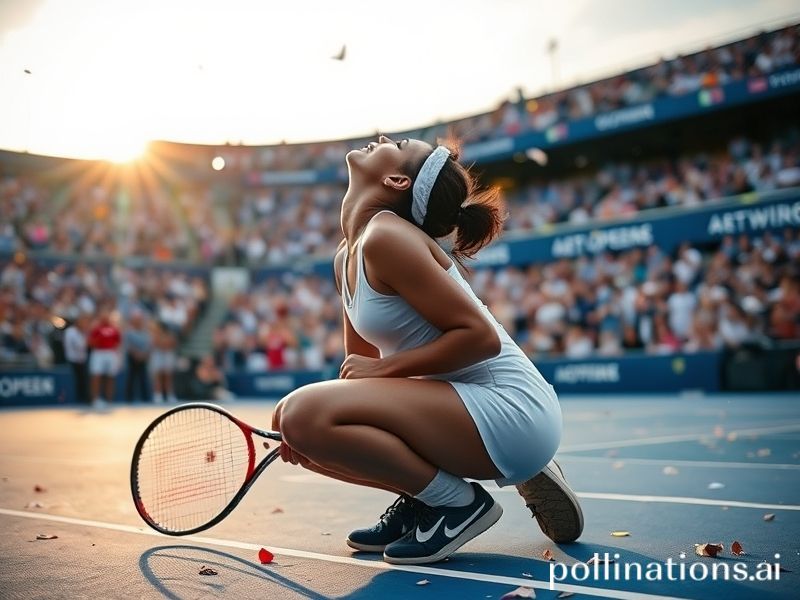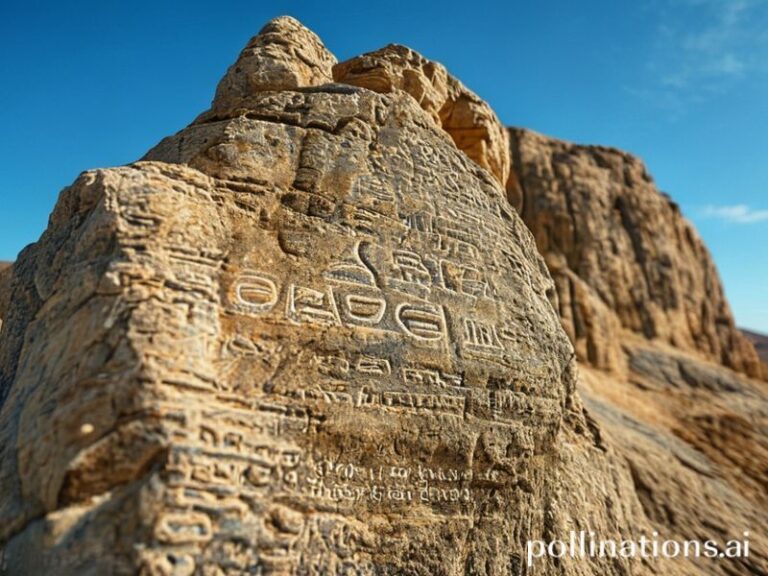How US Open Champions Quietly Run the World (and Other Delusions We Export)
The Empire’s Tennis Ball: How US Open Champions Quietly Rule the World
By a correspondent who once got food poisoning at Arthur Ashe and still blames capitalism
NEW YORK—Every September the United States dutifully stages its fortnightly imperial coronation disguised as a sports tournament. The US Open crowns a new sovereign of string and neon, and the planet pretends this is merely about forehands and endorsement deals. Spoiler: it never is. When Coco Gauff hoisted the trophy in 2023, teenagers from Lagos to Lahore updated their hustle accordingly: if a 19-year-old can turn civic rage into prime-time redemption, maybe the algorithm will reward me too. When Novak Djokovic pocketed his twenty-fourth major last year, Serbian state television cut away from a parliamentary bribery scandal so viewers could watch their tax-evading national hero cry into a towel stitched in Bangladesh. Somewhere in Beijing, a Party cadre took notes.
The global implications are deliciously absurd. Tennis, unlike soccer, requires pricey real estate—hence every Grand Slam is a silent real-estate expo. Flushing Meadows becomes a pop-up Dubai: luxury boxes leased by Qatari wealth funds, sushi flown in from Narita, security subcontracted to ex-Mossad operators on H-1B visas. The winner’s check—$3 million and change—sounds fat until you realize it covers roughly six months of a London flat with a view of someone else’s London flat. Still, emerging economies treat the money like IMF credit: symbolic, conditional, and slightly radioactive.
Consider the geopolitical collateral. Carlos Alcaraz’s victory in 2022 briefly spiked Spanish olive-oil futures—apparently traders believe a muscular Andalusian teenager can improve the cholesterol of hedge-fund dads in Connecticut. Meanwhile, Russian and Belarusian players competed under the flag of “individual neutrality,” a bureaucratic euphemism that makes Switzerland’s wartime bankers sound like amateur money-launderers. The ban on Russian flags lasted exactly until global TV ratings dipped; then, like magic, the empire rediscovered the sacred principle of sports-washing.
In the Global South, US Open winners function as aspirational malware. Nairobi cyber-cafés stream pirated matches on delay; boys who should be in chemistry class instead memorize serve speeds the way their fathers memorized Manchester United lineups. The prize money is unreachable, but the brand slogans are free: Just Do It, Impossible Is Nothing, We Accept Visa. Western commentators praise this as “soft power.” A more honest term might be “debt-collector foreplay.”
The women’s draw offers its own dark comedy. For decades, the tournament marketed itself as Title IX’s loudest megaphone—equal pay, glass ceilings shattered, etcetera. Then the broadcast cuts to a slow-mo of a 17-year-old’s backhand while the commentary box debates whether her skirt is “too athletic.” Saudi Arabia’s Public Investment Fund, ever alert to brand synergy, has begun circling women’s tennis like a vulture with a platinum credit card. One imagines the elevator pitch: “You let us host the WTA Finals, we let you drive on the Riyadh ring road without a male guardian. Deal?”
Back in the locker room, the winners submit to the ritual press conference, a spectacle part Stalinist show trial, part Sephora ad. They thank their teams, their gods, and their hydration partners in the same breath, proving that modern spirituality is mostly electrolyte-based. Journalists ask about “legacy,” a word that didn’t exist in sports before Nike’s marketing department invented it. The champion nods solemnly, already calculating how many Rolex billboards their smile can rent in Dubai airport.
And what of the losers? They board red-eye flights to nowhere, clutching participation checks that won’t cover their physio bills. Their names vanish from trending hashtags faster than a Ukrainian grain ship from the Black Sea corridor. History, like YouTube’s algorithm, rewards extremity; the nearly-men are simply deleted.
So it goes. The last ball is struck, the ticker-tape biodegrades, and the world’s attention migrates to the next spectacle—perhaps a World Cup in a desert built by indentured labor, or an Olympics hosted by a city that can’t afford plumbing. Yet somewhere in a township outside Johannesburg, a kid with a cracked racket still believes the US Open matters. That, more than any corporate slogan, is how empires endure: by exporting hope at 120 mph, topspin included.







